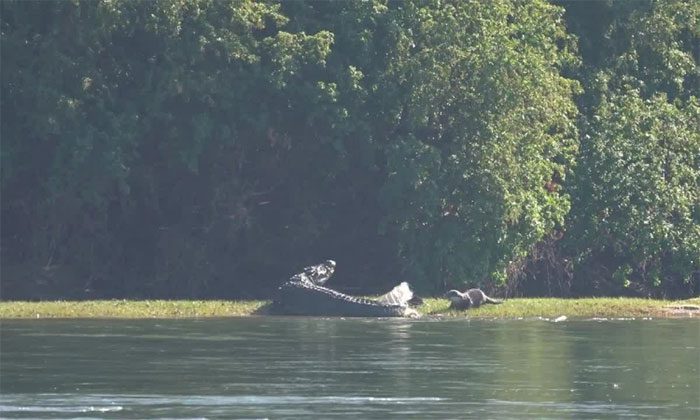Despite the threatening open jaws of a crocodile, the otter repeatedly charged in to attack, likely to protect its young.
Iain McDonald heard a loud roar from across the river while making tea at the Mayukuyuku camp in Kafue National Park, Zambia, as reported by Mail on April 20. McDonald later discovered that the “owner” of the roar was a crocodile approximately 2.5 meters long, which was dealing with an otter.
In the video recorded by McDonald, the otter charged in to bite the crocodile’s tail. Undeterred by the large predator’s open jaws, the otter continued its attack, this time biting the crocodile’s body.

Otter biting crocodile’s tail.
“I was quite confused; clearly, the otter was playing with fire. But upon reviewing the video, the otter seemed very clever. It attacked the crocodile’s tail and avoided its sharp teeth. The only reason I can think of is that the otter had young nearby and was trying to drive off the crocodile. I don’t think it would risk its life just to play, but I can’t say for sure,” McDonald shared.
“This is the first time I have encountered otters in Africa. I had set up a camera on a stand facing the Kafue River while making tea at the camp. I heard the roar and thought it was a lion on the other side of the river. But to my surprise, it was a large crocodile roaring at the otter,” he added.
After the encounter, the otter moved a few meters away to drink water before darting into the bushes. The crocodile remained for a little longer before also crawling back into the river, McDonald noted.
There are four species of otters living in Africa, including the spotted-necked otter (Hydrictis maculicollis), the African clawless otter (Aonyx capensis), the Congo clawless otter (Aonyx congicus), and the Eurasian otter (Lutra lutra). The Congo clawless otter typically feeds on relatively soft prey such as frogs, eggs, and small terrestrial vertebrates, while the other three species primarily consume fish, frogs, and small crustaceans. All four species are classified as “vulnerable” in the International Union for Conservation of Nature (IUCN) Red List.


















































